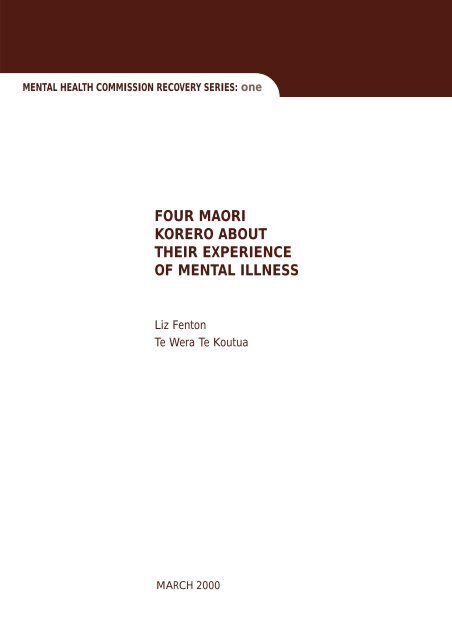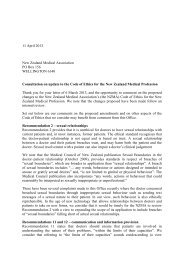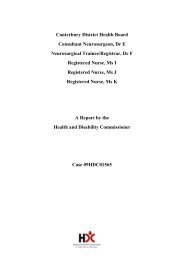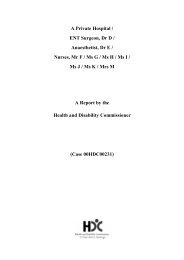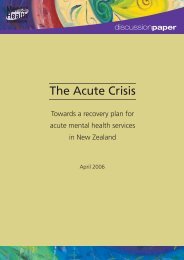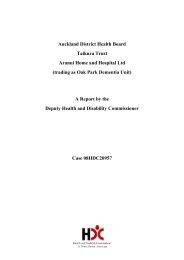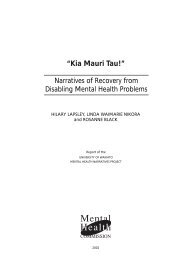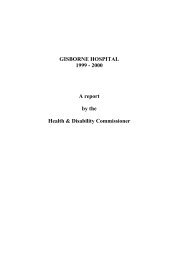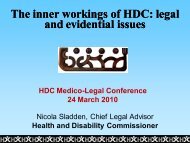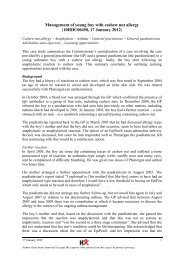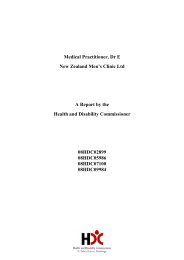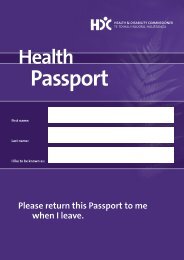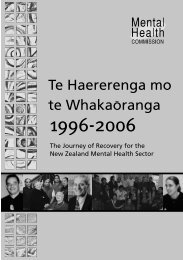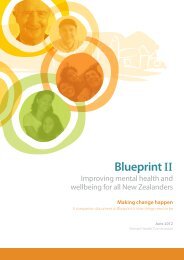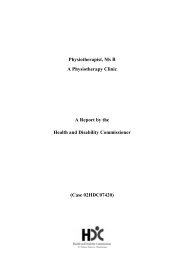FOUR MAORI KORERO ABOUT THEIR EXPERIENCE OF MENTAL ...
FOUR MAORI KORERO ABOUT THEIR EXPERIENCE OF MENTAL ...
FOUR MAORI KORERO ABOUT THEIR EXPERIENCE OF MENTAL ...
Create successful ePaper yourself
Turn your PDF publications into a flip-book with our unique Google optimized e-Paper software.
<strong>MENTAL</strong> HEALTH COMMISSION RECOVERY SERIES: one<br />
<strong>FOUR</strong> <strong>MAORI</strong><br />
<strong>KORERO</strong> <strong>ABOUT</strong><br />
<strong>THEIR</strong> <strong>EXPERIENCE</strong><br />
<strong>OF</strong> <strong>MENTAL</strong> ILLNESS<br />
Liz Fenton<br />
Te Wera Te Koutua<br />
MARCH 2000
2<br />
This is the first in a series of four publications on recovery.<br />
The other three in the series are on recovery experiences of<br />
family members of people with a mental illness;<br />
Pacific people who have a mental illness; and<br />
people who have used forensic services.<br />
There are no copyright restrictions on this publication.<br />
It is available on the Mental Health Commission’s website:<br />
http:// www.mhc.govt.nz<br />
Published by the<br />
Mental Health Commission<br />
P O Box 12 479<br />
Wellington<br />
Tel (04) 474 8900<br />
Fax (04) 474 8901<br />
email info@mhc.govt.nz<br />
March 2000<br />
ISBN: 0-478-11369-2<br />
Cover paintings by<br />
Reimana Hobman, Pablos Art Studios, Wellington<br />
Cover design by<br />
Caroline Hind
MIHIMIHI<br />
Uhia te rito o te harakeke. Kei whea te komako e<br />
ko? He aha te mea nui? Maku e ki atu. He tangata<br />
He tangata He tangata.<br />
Ko te timata tenei o nga pitopito korerorero, me nga<br />
whakaaro hoki mo nga tangata whaiora mai i te Herenga<br />
Wairua tae noa ki Maniapoto me Taranaki huri noa ki te<br />
Tau Ihu o Te Waka a Maui.<br />
Noreira koutou maa he tino nunui nga mihi aroha kia<br />
koutou mo i ou koutou kaha, ka puta enei pitopito<br />
koreroreo, whakaaro, whakahirahira mo te koutou<br />
koreroreo purakau. He tautoko ahau to koutou<br />
mamaetanga, pouritanga, hoki i roto i era hohipera e nga<br />
wa o mua tae ki tenei waa. Kia kaha, kia maia, kia<br />
manawanui.<br />
Ma te Atua he manaaki he tiake e nga wa katoa.<br />
3
CONTENTS<br />
Commission’s Foreword 7<br />
Author’s Summary 10<br />
Tania’s Story 13<br />
What hindered my recovery? 13<br />
What helped my recovery? 15<br />
John’s Story 19<br />
What hindered my recovery? 19<br />
What helped my recovery? 22<br />
Sarah’s Story 25<br />
What hindered my recovery? 25<br />
What helped my recovery? 26<br />
Mark’s Story 29<br />
What hindered my recovery? 29<br />
What helped my recovery? 30<br />
Appendix:<br />
The Blueprint on Recovery and Maori People 33<br />
What is recovery? 33<br />
Maori and recovery 34<br />
Workforce 34<br />
Discrimination and recovery 35<br />
5
Commission’s Foreword<br />
In 1998 the Mental Health Commission organised hui throughout<br />
the country for Maori who were involved with kaupapa Maori and<br />
mainstream mental health services. Hui participants strongly<br />
recommended that the Whare Tapa Wha model, a holistic approach<br />
to wellbeing encompassing taha wairua, taha hinengaro, taha tinana<br />
and taha whanau, must be used to measure outcomes for Maori<br />
who chose to have kaupapa Maori treatment, whether they be in a<br />
kaupapa Maori service or a mainstream service. The hui emphasised<br />
that Whare Tapa Wha is the basis of kaupapa Maori mental health<br />
services in Aotearoa. The four stories told in this publication reinforce<br />
this message; knowing who you are and where you come from, and<br />
re-integrating yourself with your people in your own way, is the basis<br />
of recovery.<br />
Mason Durie, psychiatrist, and Head of the Department of Maori<br />
Studies at Massey University said that to recover from a mental illness<br />
Maori must have the opportunity to develop a secure identity and<br />
fully participate in society and the economy. There also needs to be a<br />
strong Maori workforce, and more and better mental health services<br />
that are controlled by consumers, whanau and their community. He<br />
said that medicalisation of Maori mental health problems may not<br />
be the most helpful approach for Maori with a mental illness. 1<br />
For many tangata whaiora, the shame they and their whanau feel<br />
stops them and their whanau from telling people about the mental<br />
illness. This is a barrier to recovery because this silence encourages<br />
the very discrimination that the whanau is trying to avoid. Whanau<br />
need to feel they can come forward and seek assistance; this requires<br />
a huge shift in thinking about mental illness by the whole country.<br />
1 Durie, Mason. Mental health and Maori development. in Australian and New<br />
Zealand Journal of Psychiatry 1999; 33:5-12<br />
7
8<br />
“It is one thing to have people live within the community; it is another<br />
to include people as part of the community.” 2<br />
The kaupapa Maori services mentioned in these stories provided a<br />
whanau atmosphere for those who could access them. The people<br />
using the services felt ‘at home’ and were able to find their own<br />
path to better health. There is an urgent need for more and better<br />
kaupapa services, especially for people who are very unwell.<br />
There is no doubt that mainstream services are often inappropriate<br />
for Maori. While there has been considerable growth in services for<br />
Maori there is still a long way to go. All 21 Hospital and Health<br />
Services now provide some mental health services for Maori,<br />
compared to only 13 in 1995.<br />
There are not enough Maori working in mental health services and<br />
those that are working in mainstream services often feel restricted.<br />
Mainstream services must have Maori staff and they must feel that<br />
they are supported by the service to provide a kaupapa Maori service<br />
for Maori clients.<br />
At the Commission’s 1998 hui, providers reported that many kaupapa<br />
Maori services were treating many more people than they were<br />
funded for, relying on the goodness of staff working extra unpaid<br />
hours and voluntary workers. They expressed concern that referrals<br />
to kaupapa Maori services were not accompanied by the necessary<br />
funding. It is also general knowledge that there is not the range of<br />
kaupapa Maori services to cope with various levels of support needed.<br />
Two of the stories in this publication touch on problems with<br />
medication. The 1998 hui strongly criticized the heavy medication of<br />
many Maori in mainstream services. The Commission emphasises<br />
that while the wrong medication or the wrong dose is damaging<br />
and to be strongly condemned, medication can be an extremely<br />
important part of the recovery process for many people. Tangata<br />
2 ibid
whaiora have the right to full information to enable them to make<br />
better decisions about the use of medication. The decision to use, not<br />
use, or go off medication are all choices that require a joint approach<br />
involving whaiora and clinician, both armed with knowledge and<br />
following through with a plan to monitor the effects. This is often a<br />
process of trial and error which takes time and patience.<br />
A kaumatua service-user focus group (used by Tuia Services) that as a<br />
collective group had a long history of contact with mental health<br />
services, wanted to see the development of Maori mental health<br />
services for Maori by Maori “so that rangatahi did not have to walk<br />
the same path they had travelled”. 3 The important factors for good health<br />
for this group were: having access to services when needed, access to<br />
kaumatua and kuia, being able to attend hui and other important<br />
social events, taking their medication, following instructions from<br />
health professionals, and being able to cope and manage their illness.<br />
Mason Durie said, “If they are to be effective, mental health services<br />
must coincide with Maori realities. According to the Treaty of Waitangi<br />
principle of options, Maori should be able to access services that are<br />
geared to their own cultural expectations, if that is what they wish”. 4<br />
Durie said that there needs to be more clinical research by Maori and<br />
clinicians in partnership that has a Maori cultural focus upon which<br />
evidence-based best practices can be developed for Maori mental<br />
health services.<br />
Dr Barbara Disley Denis Simpson<br />
Chair Kaumatua<br />
Mental Health Commission Mental Health Commission<br />
3 Ira-a-Tuia Corporate Identity. Tuia Services Maori Mental Health, South Auckland<br />
Health, December 1998<br />
4 Durie, Mason. See footnote 1<br />
9
10<br />
Authors’ Summary<br />
The value in writing a paper of this kind, lies not just in the information<br />
it contains but also in the validation of the journeys of the four tangata<br />
whaiora who tell their stories. The Mental Health Commission in its<br />
Blueprint for Mental Health Services in New Zealand talks of recovery<br />
as being a different journey for everyone. However, some common<br />
themes were expressed by the tangata whaiora in their korero about<br />
their individual journeys through the mental health system.<br />
For Maori tangata whaiora the recovery process is more a journey of<br />
rediscovery. Ko wai? No whea? Naa wai? (Who are you? Where do<br />
you come from? Who are your parents?) Knowing the connections<br />
that make them who they are is the foundation of recovery. For many,<br />
this foundation is missing because the traditional tribal nature of<br />
Maori culture has been gradually eroded by the effects of colonisation<br />
and urbanisation. Along with the loss of identity and separation from<br />
nga tikanga o ratou maa, the mental health system has mistakenly<br />
diagnosed experiences such as hearing voices or having visions. Our<br />
old people believed these experiences were te ao wairua which<br />
connected us to past, present and future. This ability to communicate<br />
with our tupuna was once viewed as very important. Today there is a<br />
resurgence of returning to the old ways, yet it is disturbing to see the<br />
negative impact the western medical model still has on Maori tangata<br />
whaiora.<br />
All four participants in this paper needed to reclaim their identity as<br />
Maori to begin their journey to wellness. Consequently, whanau had<br />
a huge role to play in the general well being and recovery of those<br />
who chose to involve them. For some, whanau were there to look<br />
after them. Others returned to their extended whanau to find their<br />
spiritual and cultural roots. One participant claimed that her whanau<br />
helped her redefine her experience of mental illness and to use spiritual<br />
approaches to dealing with it. Kaupapa Maori services also provided<br />
a whanau atmosphere for those who could access them.
Some participants shared a strong bond with other Maori tangata<br />
whaiora. And they regarded tangata whaiora who were further along<br />
in the journey to recovery as inspiring role models. Two of the<br />
participants had married other tangata whaiora who understood and<br />
supported their recovery. Some of them worked to support or<br />
advocate for other tangata whaiora. They said working to support<br />
others’ recovery helped with their own recovery.<br />
The tangata whaiora who participated in this korero, were also able<br />
to clearly identify those things which made their recovery more<br />
difficult. Mainstream mental health services and discrimination were<br />
the biggest culprits.<br />
Mainstream services were seen to be dominated by the western<br />
medical model which is pessimistic about recovery and assumes people<br />
will need medication and services for the rest of their lives. No efforts<br />
were made to treat tangata whaiora in a holistic way. The staff in<br />
these services were often unhelpful and did not address the cultural<br />
needs of participants.<br />
Institutionalised tangata whaiora sometimes experienced abuse by<br />
patients and staff. They learned to shut up and accept what was<br />
happening, so they could get out more quickly. They were often<br />
coerced into compliance and felt they had no rights.<br />
The tangata whaiora also lacked knowledge of community services<br />
and resources and information about their treatments and side-effects.<br />
They found that both mainstream and kaupapa Maori services were<br />
often hard to access when they wanted them. Once they were<br />
discharged into the community they were left to fend for themselves<br />
without follow-up.<br />
All participants experienced the feeling of being alone. They had felt<br />
ashamed of their mental illness and were discriminated against by<br />
whanau, the services and the wider community. Some experienced<br />
double discrimination – on the grounds of their ethnicity as well as<br />
their mental illness.<br />
11
TANIA’S STORY<br />
Ko te kai korero tuatahi he wahine toa, he wahine humarie<br />
no Ngapuhi whanui tonu.<br />
I first used mental health services in 1992. After my first episode I<br />
found my way home to the far north where I’m from. Back to my<br />
whanau. I’d been quite distant from my whanau and felt like a<br />
stranger. I had another episode there but I hesitate to call it mental<br />
illness. I experienced an emotional and spiritual and psychological<br />
upheaval. I choose to call a healing crisis because it brought my<br />
attention to things in my life I needed to change in order to heal and<br />
move on.<br />
What hindered my recovery?<br />
When I first went into hospital I went in with all my own in-built<br />
prejudices against people with mental illness. So that all of that was<br />
magnified, ‘Shit I’ve become like that!’ I was so totally traumatised<br />
and shocked with the whole experience, that it led me to be suicidal.<br />
You know, it’s nothing to be taken lightly. It really impacts on people.<br />
My first episode was quite a public episode. People who I thought<br />
were my friends were no longer there for me and the doors were<br />
slammed in my face. I felt very ashamed, given what had gone on. I<br />
couldn’t cope with one day being a good parent, happy, active,<br />
popular, involved in the community, and then suddenly losing all of<br />
that and feeling like I was at the bottom of a pit. I experienced long<br />
periods of hopelessness and wondered if I would ever be able to<br />
recover and to reclaim my life. I did have a few helpful and<br />
understanding friends. Part of their advice was to leave the area if I<br />
could, and I did.<br />
13
14<br />
The services were inadequate and unhelpful and they made things<br />
worse. When I first went to hospital, there was definitely something<br />
happening but it wasn’t dealt with. I had an experience of psychosis<br />
or mental illness or whatever, but on top of that I was re-traumatised<br />
through the hospitalisation process. Nothing was explained to me. I<br />
had side effects from the medication, I wasn’t fully informed or a<br />
part of decision-making. I didn’t know about advocates. I didn’t know<br />
what I was entitled to. Lack of information and support for myself<br />
and my whanau definitely hindered my recovery. It took two years<br />
for my healing and recovery to start.<br />
After my first hospitalisation I went home on a lot of medication to a<br />
seven year old child, and was just left to my own devices. I didn’t<br />
know what on earth was going on. I can remember going back to<br />
the hospital and saying, ‘You’ve got to cut down on the medication,<br />
I’ve got a seven year old to look after, and I just keep falling asleep all<br />
the time.’ I shouldn’t have had to do that. I should have had support<br />
or some kind of follow up. I had to do it all myself, nobody helped<br />
me. I was lucky that my whanau looked after my daughter, but in<br />
terms of services or any kind of referral or assistance, once you leave<br />
the acute services, no way. And then they wonder why we keep<br />
coming back. Because you actually aren’t given any of the options<br />
and the tools you need to stay out. I was in and out of bloody hospital<br />
every couple of weeks. Jeez, it was terrible.<br />
In my last admission there were posters on the walls for the patients<br />
about our rights, but look out if you go to the staff and say ‘Hey, I’ve<br />
been reading this, and I’ve got a right to a b and c’. I’ve actually seen<br />
nurses kick over furniture and slam doors because you dared to<br />
actually say as a patient, ‘I have a right and I would like what it says<br />
on that bit of paper on the wall’. The reaction is so scary, you learn to<br />
shut your mouth or you get a bit irate and put your foot down. No<br />
way. You’re dragged off to isolation when you get angry. A complete<br />
denial of my rights as far as I’m concerned.
You learn very fast what to say and what not to say. And how to<br />
protect those things. And not to reveal them to others who don’t<br />
understand. It’s, ‘Do what we say, comply with your pills, don’t make<br />
a fuss, and you’ll be able get out of here’. That’s a kaupapa of total<br />
coercion.<br />
What helped my recovery?<br />
The way my experience was viewed by my whanau was very, very<br />
different from the way it was viewed by the psychiatrists and the<br />
nurses. What people call mental illness is what we call wairangi or<br />
poorangi, which means existing in another worldly way. A psychiatrist<br />
from Switzerland will believe I’m hearing voices and have<br />
schizophrenic tendencies, but to a Maori I’m hearing my tupuna talk<br />
to me.<br />
The whanau better understood what was happening for me than I<br />
knew myself, and they guided me through a process of kaupapa<br />
Maori healing. Mostly, reconnecting me with my whenua, my moana,<br />
my maunga and my marae, and guiding me through tikanga and<br />
matters of wairuatanga. Because it was lost to me. All my life I had<br />
been raised in the Pakeha way and only had token involvement as a<br />
Maori. I was totally out of balance in terms of who I am, and by<br />
returning to my whanau I learned what it is to be Maori.<br />
The key question my whanau asked me was, ‘What were you doing<br />
when this first happened?’ No one in the mental health services had<br />
really asked me that question, and so I would korero to them about<br />
the church I had been involved in, and that was identified as the key<br />
issue. One of the key factors in my recovery was leaving the religion<br />
that I was associated with at the time. However, I have continued to<br />
work on and nourish a very constant daily spirituality.<br />
15
16<br />
I need to be kept safe and looked after by the whanau while I go<br />
through that process. Other tangata whaiora are better off finding<br />
their healing and recovery outside their whanau, because of stuff<br />
that may be going on there. That’s a choice.<br />
Don’t make assumptions about where we feel safe and<br />
how it is best for us to heal. For some of us it’s with our<br />
whanau and for others it’s on their own. We’ve got a<br />
right to make those choices.<br />
I was better off sleeping on the floor at my kuia’s house,<br />
going to the hot pools, being with my whanau, and just<br />
allowing the process to run its course.<br />
If one member of the whanau got tired then I went to another one.<br />
That was good. As long as I was around normal everyday functioning<br />
people it gave me some sense of groundedness. But as soon as you’re<br />
in a hospital all that goes and you think, ‘I’m in the bin. I can be as<br />
stupid as I want to be now, I don’t even have to try’.<br />
There were some staff and some people in the mainstream services<br />
who were helpful. But they were definitely in the minority. There are<br />
more options now and it is helpful for Maori to have access to kaupapa<br />
Maori services. When I was offered a place in kaupapa Maori services<br />
I refused it because it was uncomfortable for me at the time. But<br />
after I went home and reconnected with my whanau, I was more<br />
ready to access kaupapa Maori services. I’m definitely all for it if the<br />
person agrees, and that will depend on where they are in terms of<br />
being Maori. I have seen a lot of progress in kaupapa Maori services<br />
in the far north. But takes time.<br />
After a while I was lucky enough to be around people who had<br />
survived trauma and distress, or for want of a better word, mental
illness. I would look at them and think ‘Well, you’re OK, your living<br />
your life, you have a family’, and that gave me some hope. There<br />
wasn’t a lot of hope in the messages I got through the hospital,<br />
‘Take these pills, this is a chronic illness, there is no hope of recovery,<br />
just accept it and exist’. The hope came from friends and others who<br />
had been through similar experiences.<br />
It was very healing when we tangata whaiora had waiata, mirimiri,<br />
foot massage, korero awhi, went on van trips and collected kai moana<br />
and cooked it for ourselves. But that was generated amongst<br />
ourselves. I married a tangata whaiora and together we support and<br />
understand each other. So with his support and my ongoing focus<br />
on spirituality, staying in close contact with my whanau, knowing<br />
what my limitations are, this is all part of my recovery.<br />
For the past five years I’ve been doing the mahi – to get back in the<br />
ring as a consumer representative, consultant or adviser to push the<br />
issues and say, ‘Hey, you know, on paper this look’s good, but what<br />
we’re getting is bloody terrible’. But oh, I’m getting tired. I just want<br />
to go fishing.<br />
I’m happy. I’m a very, very different person to the one I was seven<br />
years ago. Everything is kei te pai. It has changed my life to an<br />
incredible degree for the better. I never thought I would say that. I<br />
don’t consider myself living with an ongoing mental illness. I consider<br />
that I had a healing crisis and that I needed to change something in<br />
my life. I reconnected with what it is to be Maori. I choose not to<br />
take medication. I tend more to be into homeopathics, meditation,<br />
herbs, vitamins, swimming, walking, karakia. If I do feel I need help,<br />
I’ll choose who I want to korero with. – they’ll be the people who<br />
will support me to make my choices.<br />
They’re some of the tools for my ongoing recovery.<br />
17
JOHN’S STORY<br />
Ko te kai korero tuarua he uri mokopuna no te Tau Ihu o te<br />
Waka a Maui i te Waipounamu.<br />
I was raised by my grandparents who were fluent in te reo me o nga<br />
tikanga. Maori was my first language. But then I was returned to my<br />
real family about the age of seven or eight. My mum was the only<br />
one who spoke Maori and she wouldn’t around Dad. Hence I spoke<br />
guttural English and found it very difficult to fit in. As a child I was<br />
ridiculed and punished for speaking Maori, and I learnt very quickly<br />
that I had to be good at English and everything Pakeha. It was no<br />
longer OK to be Maori and I shut down that part of myself. I became<br />
a bit of a loner and left home when I was about 15. I did a lot of<br />
alcohol and drugs which first took me into the mental health system<br />
in the early 1980s. One day when I came out of a binge, I had slashed<br />
my wrists and I was hanging over the end of the bath. That took me<br />
into Tokaanui hospital for the first time.<br />
What hindered my recovery?<br />
I just took what everyone said about me as gospel. I would stand in<br />
the dock, and the judge and the cops would say, ‘You did this’, and<br />
I would say quote Guilty’. Then the judge would say ‘Two years,<br />
stand down’. That was my life. I’d wake up in hospital and they’d<br />
say, ‘We’re going to help you’. And I believed them. They didn’t ask<br />
me anything about who I was, where I came from, that kind of stuff,<br />
just that that they were going to help me.<br />
19
20<br />
I didn’t know I had any rights. They just said ‘This is<br />
going to happen, you’ll do this, we’ll look after you,<br />
we’ll make you better’. And I said ‘Cool’. I trusted them.<br />
Everything they did to me, I thought must be helping<br />
me. I remember signing a consent form, but I couldn’t<br />
even read the damn thing, or understand what the hell<br />
I was signing.<br />
There was not a lot of information. In fact I wasn’t told a damn<br />
thing. Looking back I don’t know how they got away with treating<br />
me the way they did. I guess the main tool they used to keep you in<br />
place was medication, but the side effects were horrendous. I vividly<br />
remember shaking and frothing at the mouth and not being able to<br />
move, sleeping all the time. It was chronic.<br />
What I remember most is the lolly trolley, three times a day. Every<br />
day it seemed that my pills had changed colour or they’d added<br />
another one. No one told me what was going on. They never said<br />
anything about my condition. All they told me was that I was going<br />
to get well. Again, I just did what they told me to do. One time I<br />
questioned the nurse when she gave me my pills and I asked ‘What’s<br />
this one?’ because I knew it was a different colour. She said, ‘Just<br />
take it!’ So I took it, got up and walked down the corridor and fell<br />
over flat on my face. I was convulsing because I’d overdosed on the<br />
goddam pills. The next time they gave me my pills, that blue one<br />
wasn’t there. It wasn’t there.<br />
I guess having an Indian doctor didn’t help. I couldn’t understand<br />
him half the time, because of the medication and his accent. I would<br />
get so frustrated I would just say, ‘Yeah, yeah’ and agree to anything.<br />
Then I wouldn’t see him again for a month. Isn’t it amazing to have<br />
a psychiatrist who sees you once a month for five minutes, and then
writes in your file which is about 5,000 pages long. And the guy has<br />
seen you only once or twice in six months. It’s incredible.<br />
Our old people had practiced communicating with our tupuna<br />
regularly. It was as common as drinking or eating to them, but the<br />
hospitals are full of Maori who have been closed down from accessing<br />
te ao wairua. In the early to mid 80s when I was in hospital there was<br />
all the old colonial bullshit, ‘We know what’s best for you Maoris’.<br />
I felt intimidated, suspicious of everyone and very much alone. I kept<br />
to myself most of the time. But I also met people in hospital who I<br />
identified with, and they always happened to be Pakeha. I had given<br />
up on being Maori. That shame thing. I didn’t want to be Maori. I<br />
don’t think there was even a Maori on the staff in my ward. That was<br />
a major hindrance to my cultural well-being. My family didn’t help. I<br />
hid from my family because of the shame stuff. It wasn’t until my<br />
mother’s tangi that they even knew I’d even been in hospital.<br />
You didn’t have a choice whether you were ready to leave the hospital<br />
or not. They just told you, ‘You’re going home’. And that’s when the<br />
shit hit the fan, because straight away my thoughts would be going,<br />
‘What am I going to do? Where am I going to go?’ Then the next<br />
thing you know you’re standing out the gate. And off you go. A lot<br />
of people would be back in there two days, a week or a month later.<br />
I walked out the door of the hospital alone, with nowhere to go.<br />
There were no services available. So I did what I always did, I headed<br />
to the nearest drug dealer and the nearest pub. Being on medication,<br />
I was a timebomb waiting to go off, which eventually happened of<br />
course. I kept ending up back in hospital for things I can’t imagine<br />
doing now.<br />
I guess one thing that stopped me from getting better was shame<br />
and guilt. I’d get so paranoid that people were talking about me<br />
saying, ‘Here comes that nutter’. I had to hide away. That was one of<br />
21
22<br />
the things that kept me stuck. You just hit the street and you were<br />
on your own. My family weren’t there, depression was my constant<br />
companion, and my belief that I was different kept me from<br />
interacting with the community I was in. So, I did what I had always<br />
did to survive. I kept taking drugs.<br />
What helped my recovery?<br />
When I was in hospital I formed some relationships with others on<br />
the ward – one kuia in particular. We spent a lot of time talking,<br />
going for walks, and just being. The cultural stuff was done around<br />
the cups of tea and cigarettes with the bro’s and the rest of the<br />
whanau. That’s where it was done. That’s where all the healing and<br />
stuff was done.<br />
The one thing that helped me in my own journey was a belief in<br />
myself that it had to get better and that only I could change it. And<br />
my nanny believed it too, even though I kept bouncing in and out of<br />
hospital, and in and out of jail. I always knew that it had to get<br />
better. In 1985 in Porirua Hospital I got a call saying my mother had<br />
died. I don’t remember her tangi very much at all because I was too<br />
medicated. I wasn’t able to feel. I felt left out and alone. One good<br />
thing that happened though, was that I made a decision I was never<br />
going back to jail or to hospital. God knows how I managed to do it<br />
but I’ve done both.<br />
Then one time when I ended up in front of the courts they decided it<br />
was time I went to a treatment centre for my drug addiction. And<br />
that was the beginning. I was with people that knew me and<br />
understood where I was coming from. I met some people that were<br />
on the same journey and it started me on my journey of rediscovery.<br />
I figured out maybe it was the drugs that keep taking me back to<br />
hospital. Then I ran into a group of Maori people that were on the
ecovery trail and that helped. They took me on their journey and<br />
were able to wake me up culturally. And I guess too, that being with<br />
a Maori group I was looked to for leadership and my whakaaro was<br />
valued, even though I had lost a lot of the language. I knew that<br />
those things were there and I needed to return to te ao wairua to<br />
rediscover my true being. I’ve stayed away ever since from the mental<br />
health system and medication.<br />
Being straight gave me the courage to return home and face my<br />
whanau, who basically welcomed me with open arms. I realised it<br />
was me that had been keeping them away, because I had continually<br />
used and abused them. The combination of alcohol, drugs and<br />
medication meant I had been in a constant state of unreality. Being<br />
straight also began to awaken those things that my nanny had taught<br />
me. I began to search out my whakapapa. After a year clean I had a<br />
spiritual awakening which enabled me to go to my marae. I totally<br />
re-immersed myself in waiata a ringa, Kapa haka, waiata tawhito,<br />
whaikorereo and reconnect with my whanaunga.<br />
23
SARAH’S STORY<br />
Ko te kai korero tuatoru he wahine toa, no Taranaki me Tainui<br />
hoki.<br />
I first went into hospital in 1990 for depression. I’ve been using mental<br />
health services since then. Some of them have been Maori services. I<br />
was very young when I first entered the ‘system’ and I needed to be<br />
stronger than most to move on. I have been lucky, been in the right<br />
place at the right time, and I’ve learned to look after myself. But<br />
many are not so lucky.<br />
What hindered my recovery?<br />
Inadequate, unhelpful services. That’s about it.<br />
When I first went into hospital, me and my mum and dad were all<br />
interviewed. Behind a wall with a one way mirror were the so-called<br />
professionals. After three sessions they came out with the idea that<br />
my dad had molested me. That was a total shock. My dad just walked<br />
out. I couldn’t say a word. Mum just goes, ‘But he loves his daughter<br />
more than anything else’. That was really sad. Those professionals<br />
thought they had the right to decide what was going on in my family.<br />
Another sad thing my parents found was there were so many young<br />
people in the hospital, and Maori too. It drove them to tears, seeing<br />
the young people up there.<br />
I got walked all over in hospital – from the tangata whaiora and the<br />
staff. I didn’t know I had any rights. No way. One day when I first<br />
arrived at the hospital, a nurse came into my room and started looking<br />
through my bag. I just stared at her, and then she goes ‘Oh, have you<br />
got any pads?’ She wanted one for another client. Yeah.<br />
25
26<br />
I tried to keep myself safe in the hospital but I didn’t do it all the time<br />
without other tangata whaiora helping me. I was young girl just out<br />
of my teens and when you go to hospital and you’re the only girl,<br />
the guys think you’re beautiful. I was molested by lots of guys up<br />
there – it would happen all the time. That’s how I met my husband.<br />
He would drag and pull these guys off me. Yes, he was like my hero<br />
really.<br />
There was nothing else to do in hospital but sit around and smoke<br />
and drink coffee. I’ve been an asthmatic since I was 15 and when I<br />
took up smoking, it just made my asthma even worse.<br />
The only work opportunities employers offer you if you tell them<br />
you’re schizophrenic or bipolar, are cleaning jobs or making<br />
sandwiches. What kind of job is that?<br />
Another thing that has hindered my recovery. My dad passed away<br />
three years ago now and at his unveiling a mokopuna came up to<br />
me and he goes ‘Oh, you’re the crazy one, aren’t you?’ His ears had<br />
been flapping – he just picked up on what the adults had been saying.<br />
What helped my recovery?<br />
My nanny and koko (grand-parents) and my immediate family helped.<br />
They fed me, washed me, clothed me – did everything for me for<br />
two years. When I needed a break I went to my nanny and koko’s.<br />
My extended family was also informed about what was<br />
going on for me through conference calls. This was so<br />
they would get the story right and no gossip went<br />
around about me, but it didn’t always work.
In the hospital other young Maori people like myself were helpful.<br />
We were just drawn to each other. We sat at the same table, we ate<br />
our kai together, just acknowledging each other day to day, and<br />
talking together. They were an extended whanau for me.<br />
Seeing a tohunga and being blessed by him helped my recovery<br />
because it helped me to get back in touch with my Maori side. It<br />
gave me faith in spiritual things again like karakia, having water<br />
sprinkled over me when I was down, visiting my urupa where my old<br />
people are, and returning to my turangawaewae when I needed to.<br />
In the old days if you weren’t in touch with the spiritual side, then<br />
you weren’t normal.<br />
My husband who is also a tangata whaiora – he opened my mind to<br />
the spiritual side of life and to think deeply. I was brought up in a<br />
church going family but was never pushed to go that far. My husband<br />
brought me out of my shell and made me more confident. Now, I’m<br />
over-confident – I just go out there and do things. That’s helped. My<br />
parents can see that my husband has helped me a lot and has given<br />
me the love they couldn’t give me. We got married last year and<br />
we’re closer than brother and sister.<br />
I also found that getting into arts and crafts helped me a lot too. It’s<br />
taught me to be patient and I can see an end result. I really enjoy it<br />
because I work with other people.<br />
27
MARK’S STORY<br />
Ko te kai korero tuawha he rangatahi no te Taitokerau ia.<br />
I first used the mental health services in the mid 1990s when I was<br />
admitted because of self-harm. The hospital environment was not a<br />
good place for me to recover. When I left the hospital I had no<br />
information about services that could help me.<br />
What hindered my recovery?<br />
A lot of systemic things have hindered my recovery, in the way of<br />
procedures and how people go about things. For example, you have<br />
to make an appointment with a GP before you see a psychiatrist. All<br />
those kind of procedures are so confusing. Some people made out<br />
they cared and understood, but they were just putting a front up.<br />
People just shrug you off and pass you on. It’s really irritating, especially<br />
when you’re in a position where you know you want to be helped.<br />
But they refer you to someone else or push you off – ignore you in<br />
other words. What’s the point in feeling like I’m going to help myself<br />
when there are other people just shrugging you off?<br />
Being institutionalised scattered my priorities in life because there<br />
wasn’t much to do. I didn’t have to do any cooking, didn’t have to<br />
do any dishes. Making my own bed and keeping clean were the only<br />
priorities I kept. Life skills weren’t there. Group conversations were<br />
interesting but you had to wait for a certain period of time before it<br />
was your turn, and by the time your turn came around, you had lost<br />
your idea.<br />
29
30<br />
When you go back out on the streets and there’s nowhere to go and<br />
nothing to do, and you don’t know of any resources, you’re straight<br />
back to the same old lifestyle that will take you back to the hospital<br />
again. That was something I went through.<br />
A lot of providers don’t understand what people are going through.<br />
Mental illness should be one of those things that is put out there, so<br />
that people can be educated on it. It doesn’t have to be a secret. I’m<br />
grateful that there are services out there now, that weren’t there for<br />
me, or that I didn’t know about at the time. If the services are out<br />
there they should make people more aware of them. If you don’t<br />
know about the services you’re going to learn the hard way, and just<br />
trying to survive is quite aggravating. In one city I lived in, the old<br />
psychiatric hospitals were all the services I knew about. That’s very<br />
poor. My lack of understanding of the whole mental illness field has<br />
hindered my recovery – just trying to understand where the mental<br />
illness came from, and the way it has affected me, trying to get to<br />
grips with what I’ve gone through.<br />
What helped my recovery?<br />
My family have played a big part in my recovery. They helped me to<br />
focus on what the issue was. A lot of my immediate and extended<br />
family members have fallen to mental illness and have been in and<br />
out of hospitals. There were a lot of issues in my family - sexual<br />
abuse, alcohol abuse. It was pretty tough. My mother was abused by<br />
my grandfather, and had her first child to him. My aunts and uncles<br />
were abused. I am not personally involved with all that stuff and<br />
that’s helped my recovery. But I have a hell of a lot of aroha for them.<br />
I want to see something happen for the good of all my family,<br />
including myself especially. I have a future vision for myself and my<br />
family and everyone else that’s fallen to so called mental illnesses.<br />
That helps me stay in recovery.
I find my culture is a bit muddled up. I had a lot of<br />
respect for my family and when I was a kid I was<br />
brought up through Maoritanga and on the marae,<br />
laying down hangis and doing the work. But when I<br />
found out my grandfather was the monster of the<br />
family I kind of lost trust and a lack of confidence in my<br />
Maoritanga.<br />
Isolating myself from my family is a big thing I’ve been doing lately. I<br />
want to have everything all sorted out, before I face them and tell<br />
them what they’ve done to me.<br />
When you leave hospital, you feel relieved, a bit lighter, like the<br />
mountain’s come off your shoulders. When I left hospital I wanted to<br />
contribute, I wanted to be part of the service, and that’s when I<br />
realised that my calling was to be a helper.<br />
Being a support worker is part of my recovery and helps me to move<br />
forward and get over my family. Helping other people stay focused<br />
and stay clear is another part of my recovery. Listening to people is<br />
quite therapeutic for me because it helps me listen to what’s on their<br />
minds without getting stirred up or personally involved. If I can control<br />
what I’m feeling about what someone else is saying, that’s a start.<br />
I’m also a walking information billboard for other people who would<br />
like help.<br />
I find it’s good self-help to get out there because it shows me that<br />
I’m not the only one going through personal dilemmas. I do a lot of<br />
work within the community to keep myself focused and in balance.<br />
Focusing is a very important thing for me – to keep focused and to<br />
have my heart and my emotions balanced without any negativity<br />
creeping in.<br />
31
APPENDIX<br />
The Blueprint on Recovery and Maori<br />
What is recovery?<br />
The Mental Health Commission’s Blueprint for Mental Health Services:<br />
how things need to be makes it explicit that mental health services<br />
need to adopt a recovery approach in the work they do.<br />
‘Recovery is a journey as much as a destination. It is different for<br />
everyone. For some people with mental illness, recovery is a road<br />
they travel on once or twice, to a destination that is relatively<br />
easy to find. For others, recovery is more like a maze with an<br />
elusive destination, a maze that takes a lifetime to navigate.<br />
Recovery is happening when people can live well in the presence<br />
or absence of their mental illness, and the many losses that may<br />
come in its wake, such as isolation, poverty, unemployment and<br />
discrimination. Recovery does not always mean that people will<br />
return to full health or retrieve all their losses, but it does mean<br />
that people can live well in spite of them.<br />
Historically, mental health services have failed to use a recovery<br />
approach. Recovery could never take place in an environment<br />
where people were isolated from their communities and cultures,<br />
where power was used to coerce people and deny them choices,<br />
and where people with mental illness were expected never to get<br />
better<br />
Some people have experienced recovery without using mental<br />
health services. Others have experienced recovery in spite of them.<br />
But most will do much better if services are set up and delivered<br />
33
34<br />
to facilitate their recovery. Virtually everything the mental health<br />
sector does, can either assist or impede recovery.’<br />
Maori and recovery<br />
Extracts from the Blueprint:<br />
‘The high Maori re-admission rates into hospitals attest to the<br />
fact that Maori needs are not being met and something<br />
dramatically different needs to happen. Accepting Maori concepts<br />
of healing and ensuring that service contracts are supportive of<br />
this are essential if significant improvements in Maori mental health<br />
status are to be achieved.’<br />
‘A Maori perspective of health is broad; performance measures<br />
must go beyond the immediate clinical parameters to encompass<br />
wider measures of good health, and health services must pursue<br />
recovery and good health, not simply the removal of symptoms. 5 ’<br />
Workforce<br />
‘Maori are significantly under-represented in the professionally<br />
qualified mental health workforce, particularly psychologists,<br />
psychiatrists, and occupational therapists. As a result, there are<br />
reduced opportunities for cultural difference to be fully appreciated<br />
in assessment, treatment, and support and education for recovery. It<br />
is possible to call on outside expertise and to rely on whanau for<br />
advice and assistance; however, to gain the positive results needed,<br />
the number of Maori delivering mental health services for Maori must<br />
be significantly increased. In addition, short-term training is urgently<br />
5 Durie M.H. et al, Guidelines for purchasing mental health services for Maori
equired to strengthen the skills of mental health support workers.<br />
However, this should not detract from the long-term need for<br />
highlyskilled professionals.’<br />
Discrimination and recovery<br />
‘The Commission advocates zero tolerance of discrimination. This<br />
means refusing to accept it, in any shape or form. Through feedback<br />
from hui, Maori have made it clear that equity in service delivery is a<br />
starting point for reduction of discrimination, and the Commission<br />
supports this view. The Commission’s Map of the Journeys illustrates<br />
the kind of changes that need to be made; it shows seven destinations,<br />
each with a set of paths. For Maori, these are:<br />
• Active Maori participation<br />
– ensuring Maori (including tangata whaiora) have the<br />
opportunity to make the decisions for, manage, and implement<br />
mental health services for Maori<br />
• Positive Maori development<br />
– recognising the need for relevant standards, policies, and<br />
practices targeted at delivery of services to Maori<br />
• Elimination of disparities<br />
– unlocking the mental health system to ensure Maori priorities<br />
have equal consideration in the mental health sector.<br />
Maori views on mental illness are consistent with the recovery<br />
approach and all services delivered to Maori need to reflect this. Maori<br />
who have mental illness face discrimination as Maori and as tangata<br />
whaiora. Discrimination is a major barrier to recovery. Services for<br />
Maori need to reduce the impact of both kinds of discrimination if<br />
they are to succeed with the recovery approach.’<br />
35


